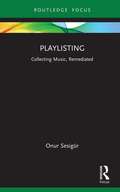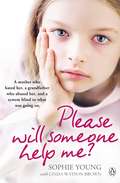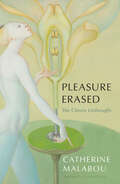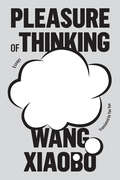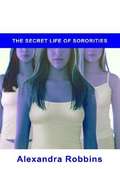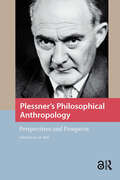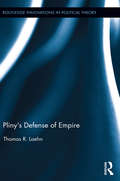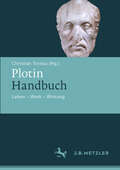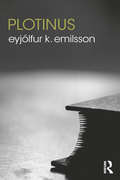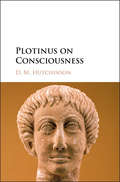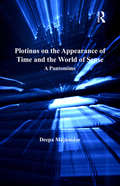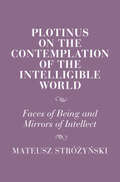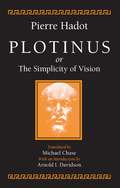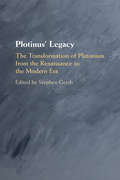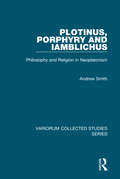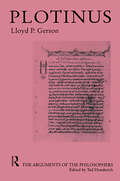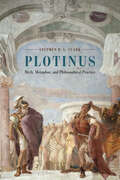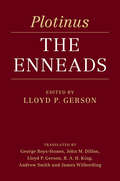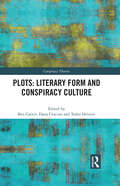- Table View
- List View
Playlisting: Collecting Music, Remediated (Routledge Focus on Digital Media and Culture)
by Onur SesigürThis book examines the collection and curation of music, and the way digital streaming services are transforming the way we engage with the media. The study foregrounds personal digital curation techniques, rather than algorithms or technology, to acknowledge the sustaining human agency involved in playlisting. The author looks at Digital Service Providers such as Spotify, Apple and Deezer, which offer their users not just access to large collections of music, but also the opportunity to create and maintain personalised consumption subsets such as playlists. Positioning these current playlisting practices as a remediation of significant cultural practices of the 20th century – such as collecting records and mix-taping – the book highlights the continuity of culture through media change, and the implications for concepts of self and identity, society and sharing. Shedding new light on this contemporary cultural phenomenon, this book will be an important read for scholars who are interested in the area of digital music from different disciplines such as communication, digital humanities and social sciences in fields of media studies, digital cultures, personal information management, digital curation and popular music.
Please Will Someone Help Me?
by Sophie YoungSophie Young tells her shocking true story in Please Will Someone Help Me?Sophie Young was born into a dysfunctional family, with a violent mother and father. Sophie was routinely neglected and harmed, starved and left to fend for herself. Social workers were often involved but, despite numerous visits and extensive reports, nothing was ever done.When Sophie was six, her life took another horrible turn: her adored grandfather began to sexually abuse her.Please Will Someone Help Me? is Sophie Young's heartbreaking story about a young girl at the mercy of the adult world. With full access to her social work files, she shows how those who are meant to help children can be blind to the reality of their lives; but how, ultimately, love conquers all.Sophie Young was the eldest of three, born into a dysfunctional family that she fought for years to escape. Now forty years old, she lives in England with her husband and children, and works as a volunteer for a national children's charity.
Pleasure Erased: The Clitoris Unthought
by Catherine MalabouThe clitoris was absent in anatomy books, in paintings and sculptures, absent in spirit and even body; it has long been the organ of erased pleasure. We assume that this oversight has been repaired in our times: today, the clitoris is not forgotten but honoured. Conferences, books, manifestos, works of art are all devoted to it. The autonomy of clitoral jouissance is recognized. The boundaries of feminism have also moved: queer, intersex and trans approaches claim that the clitoris is perhaps no longer the exclusive preserve of the woman. And yet, there remains a wounded space. Because genital mutilation is still common practice. Because millions of women are still denied pleasure. The clitoris continues to mark the enigmatic space of the feminine. Constrained by the extreme difficulty and the extreme urgency of returning to this scorched earth, it is time to give voice to an organ of pleasure which has still not become an organ of thought.
Pleasure in Ancient Greek philosophy
by David WolfsdorfThe Key Themes in Ancient Philosophy series provides concise books, written by major scholars and accessible to non-specialists, on important themes in ancient philosophy that remain of philosophical interest today. In this volume Professor Wolfsdorf undertakes the first exploration of ancient Greek philosophical conceptions of pleasure in relation to contemporary conceptions. He provides broad coverage of the ancient material, from pre-Platonic to Old Stoic treatments; and, in the contemporary period, from World War II to the present. Examination of the nature of pleasure in ancient philosophy largely occurred within ethical contexts but in the contemporary period has, to a greater extent, been pursued within philosophy of mind and psychology. This divergence reflects the dominant philosophical preoccupations of the times. But Professor Wolfsdorf argues that the various treatments are complementary. Indeed, the Greeks' examinations of pleasure were incisive and their debates vigorous, and their results have enduring value for contemporary discussion.
Pleasure of Thinking: Essays
by Wang XiaoboA yet-untranslated essay collection on the importance of critical thought, from one of the foremost Chinese intellectuals of the 1990s. Wang Xiaobo&’s Pleasure of Thinking is an essay collection as riotous as it is contemplative. Between rollicking anecdotes about living between the East and West and serious musings on the intellectual situations at home and abroad, Xiaobo examines modern life with the levity missing from so much of today&’s politico-cultural discourse. In &“The Maverick Pig,&” he considers the existential differences between humans and livestock. In &“Tales From Abroad: Food,&” he recounts the culture shock of discovering American diets while studying at Carnegie Mellon. Several pieces focus on literature, with notable essays devoted to Italo Calvino, Bertrand Russell, and Ernest Hemingway, whom Xiaobo admired greatly. Others are more personal in nature, ranging from a meditation on getting mugged, to the consideration of the question: why do I write? Controversial, hilarious, and inimitable, Pleasure of Thinking is a delightful celebration of Wang Xiaobo&’s unique critical perspective.
Pledged: The Secret Life of Sororities
by Alexandra RobbinsHere we find lushes, trollops, bigots, sadists, masochists, anorexics, and those made mad by unrequited lust for election as Prom Queen. Journalist Robbins takes a novelistic approach as she joins the "sisters" of a real-life sorority to prove that all that has been said about their entrance standards, rituals, systems of judgment and punishment, over-the-top lifestyle, and lifelong loyalty is true. She follows the stories of several women who could be considered ambitious, attractive, and intelligent as they make choices based on unhealthy regard for themselves and others. The subtext here is that these women will go on to be business and civic leaders. Annotation ©2004 Book News, Inc., Portland, OR (booknews.com)
Pledged: The Secret Life of Sororities
by Alexandra RobbinsHere we find lushes, trollops, bigots, sadists, masochists, anorexics, and those made mad by unrequited lust for election as Prom Queen. Journalist Robbins takes a novelistic approach as she joins the "sisters" of a real-life sorority to prove that all that has been said about their entrance standards, rituals, systems of judgment and punishment, over-the-top lifestyle, and lifelong loyalty is true. She follows the stories of several women who could be considered ambitious, attractive, and intelligent as they make choices based on unhealthy regard for themselves and others. The subtext here is that these women will go on to be business and civic leaders.
Plessner's Philosophical Anthropology: Perspectives and Prospects
by Jos De MulHelmuth Plessner (1892-1985) was one of the founders of philosophical anthropology, and his book The Stages of the Organic and Man, first published in 1928, has inspired generations of philosophers, biologists, social scientists, and humanities scholars. This volume offers the first substantial introduction to Plessner's philosophical anthropology in English, not only setting it in context with such familiar figures as Bergson, Cassirer, and Merleau-Ponty, but also showing Plessner's relevance to contemporary discussions in a wide variety of fields in the humanities and sciences.
Pliny's Defense of Empire (Routledge Innovations in Political Theory)
by Thomas R. LaehnDespite perennial interest in Pliny the Elder’s Natural History, the world’s first encyclopedia, as a record of the prodigious, the quotidian, and the useful in Rome in the first century AD, for centuries Pliny has been derided as little more than an inept compiler of facts and marvels intellectually incapable of formulating a cogent argument supported through the selective marshaling of his materials. In Pliny’s Defense of Empire, Laehn offers a radical reinterpretation of the architecture of Pliny’s encyclopedia, exposing fundamental errors in the inherited understanding of the text traceable to its initial reception in ancient Rome. Recognition of the text’s true structure reveals that Pliny’s encyclopedia is in fact a first-rate work of political philosophy constituting an apology for Roman imperial expansionism grounded in a sophisticated account of human nature. Correcting the accreted errors and prejudices of nearly 2,000 years of faulty Plinian scholarship, Laehn critically examines one of the most persuasive apologies for the Roman Empire ever written and succeeds in rehabilitating the Elder Pliny as one of the world’s greatest political thinkers. An excellent resource and a must read for scholars in political theory, philosophy, and classical studies.
Plotin-Handbuch: Leben – Werk – Wirkung
by Christian TornauPlotin ist der Begründer des Neuplatonismus. Seine Interpretation des Platonismus als eines konsequenten Denkens der Transzendenz findet seit der zweiten Hälfte des 20. Jahrhunderts reges philosophisches und philosophiehistorisches Interesse und wird als eigenständiger Beitrag zur Wahrheitssuche und als dem klassischen Platonismus, dem Aristotelismus und der hellenistischen Philosophie gleichrangige philosophische Tradition anerkannt. Das Handbuch verortet Plotin zunächst biographisch-historisch, beschreibt dann sowohl den Exegeten als auch den systematischen Denker und führt über eine interpretierende Inhaltsübersicht seiner Schriften in Plotins Werk ein. Der Hauptteil erläutert zunächst die philosophiehistorischen Traditionen und Kontexte von Plotins Denken und stellt dann in systematischer Form zentrale Themen seiner Philosophie dar. Abgeschlossen wird das Handbuch durch eine Gesamtdarstellung der Wirkungsgeschichte Plotins. Ein Personen- und Sachregister ermöglicht eine zusätzliche spezifische Erschließung des Inhalts.
Plotinus (The Routledge Philosophers)
by Eyjólfur K. EmilssonPlotinus (AD 205–270) was the founder of Neoplatonism, whose thought has had a profound influence on medieval philosophy, and on Western philosophy more broadly. In this engaging book, Eyjólfur K. Emilsson introduces and explains the full spectrum of Plotinus’ philosophy for those coming to his work for the first time. Beginning with a chapter-length overview of Plotinus’ life and works which also assesses the Platonic, Aristotelian and Stoic traditions that influenced him, Emilsson goes on to address key topics including: Plotinus’ originality the status of souls Plotinus’ language the notion of the One or the Good Intellect, including Plotinus’ holism the physical world the soul and the body, including emotions and the self Plotinus’ ethics Plotinus’ influence and legacy. Including a chronology, glossary of terms and suggestions for further reading, Plotinus is an ideal introduction to this major figure in Western philosophy, and is essential reading for students of ancient philosophy and classics.
Plotinus and Epicurus
by Angela Longo Taormina Daniela PatriziaThis volume investigates the reasons why Plotinus, a philosopher inspired by Plato, made critical use of Epicurean philosophy. Eminent scholars show that some fundamental Epicurean conceptions pertaining to ethics, physics, epistemology and theology are drawn upon in the Enneads to discuss crucial notions such as pleasure and happiness, providence and fate, matter and the role of sense perception, intuition and intellectual evidence in relation to the process of knowledge acquisition. By focusing on the meaning of these terms in Epicureanism, Plotinus deploys sophisticated methods of comparative analysis and argumentative procedures that ultimately lead him to approach certain aspects of Epicurus' philosophy as a benchmark for his own theories and to accept, reject or discredit the positions of authors of his own day. At the same time, these discussions reveal what aspects of Epicurean philosophy were still perceived to be of vital relevance in the third century AD.
Plotinus on Consciousness
by D. M. HutchinsonPlotinus is the first Greek philosopher to hold a systematic theory of consciousness. The key feature of his theory is that it involves multiple layers of experience: different layers of consciousness occur in different levels of self. This layering of higher modes of consciousness on lower ones provides human beings with a rich experiential world and enables them to draw on their own experience to investigate their true self and the nature of reality. This involves a robust notion of subjectivity. However, it is a notion of subjectivity that is unique to Plotinus, and remarkably different from the post-Cartesian tradition. Behind the plurality of terms Plotinus uses to express consciousness, and behind the plurality of entities to which Plotinus attributes consciousness (such as the divine souls and the hypostases), lies a theory of human consciousness. It is a Platonist theory shaped by engagement with rival schools of ancient thought.
Plotinus on the Appearance of Time and the World of Sense: A Pantomime
by Deepa MajumdarPlotinus (c.205-70) was a Neoplatonist philosopher, his work posthumously published by Porphyry and divided into six books, nine tractates each, called the Enneads. In this book Majumdar makes a valuable addition to the literature on his work, especially Ennead III.7(45)11-13 - in particular explaining Plotinus' cosmology using the genus-species model of soul, coordinating the literature on the appearance of time and the cosmos with that on the larger issue of Plotinian "emanation" and examining the role of tolma and the restless nature of soul in this conjoint appearance. This book investigates Plotinian "emanation," its laws of poiesis (contemplative making ) and the roles of nature, matter, logos, (rational formative principle) and contemplation and highlights the subtler details of Plotinus' cosmology by disentangling conceptual issues about the nature of soul and self ("we") and their impact on the process of generation of time and the cosmos.
Plotinus on the Contemplation of the Intelligible World: Faces of Being and Mirrors of Intellect (Cambridge Studies in Religion and Platonism)
by Mateusz StróżyńskiIn this study, Mateusz Stróżyński offers an experiential and practical way of understanding Plotinus' thought and philosophy through a focus on the act of contemplation. He argues that contemplation, or direct seeing of the principles of reality, is not merely a part of Plotinus' thought, but rather a significant dimension of it. Moreover, he argues that Plotinus understands metaphysics as a conceptual and propositional description of reality from a third-person perspective, as well as an expression of an experience of that reality from a first-person perspective. Stróżyński focuses on the first phase of the journey to the Good, namely, on the contemplation of the intelligible world: Nature, Soul, and Intellect. He describes the fall of the soul and her return through the lens of the so-called “Great Kinds”: Being, Movement, Rest, Difference, and Identity. Stróżyński also shows how this concept, derived from Plato's Sophist, is creatively used by Plotinus to explain both the loss and the restoration of our ability to contemplate through philosophical practice.
Plotinus on the Soul
by Damian CaluoriPlotinus on the Soul is a study of Plotinus' psychology, which is arguably the most sophisticated Platonist theory of the soul in antiquity. Plotinus offers a Platonist response to Aristotelian and Stoic conceptions of the soul that is at the same time an innovative interpretation of Plato's Timaeus. He considers the notion of the soul to be crucial for explaining the rational order of the world. To this end, he discusses not only different types of individual soul (such as the souls of the stars, and human and animal souls) but also an entity that he was the first to introduce into philosophy: the so-called hypostasis Soul. This is the first study to provide a detailed explanation of this entity, but it also discusses the other types of soul, with an emphasis on the human soul, and explains Plotinus' original views on rational thought and its relation to experience.
Plotinus or the Simplicity of Vision
by Pierre HadotSince its original publication in France in 1963, Pierre Hadot's lively philosophical portrait of Plotinus remains the preeminent introduction to the man and his thought. Michael Chase's lucid translation—complete with a useful chronology and analytical bibliography—at last makes this book available to the English-speaking world. Hadot carefully examines Plotinus's views on the self, existence, love, virtue, gentleness, and solitude. He shows that Plotinus, like other philosophers of his day, believed that Plato and Aristotle had already articulated the essential truths; for him, the purpose of practicing philosophy was not to profess new truths but to engage in spiritual exercises so as to live philosophically. Seen in this light, Plotinus's counsel against fixation on the body and all earthly matters stemmed not from disgust or fear, but rather from his awareness of the negative effect that bodily preoccupation and material concern could have on spiritual exercises.
Plotinus or the Simplicity of Vision
by Pierre Hadot“Without doubt this is the best introduction to the personal and spiritual side of Plotinian philosophy.” —John Bussanich, International Journal of the Classical TraditionSince its original publication in France in 1963, Pierre Hadot’s lively philosophical portrait of Plotinus remains the preeminent introduction to the man and his thought. Michael Chase’s lucid translation—complete with a useful chronology and analytical bibliography—at last makes this book available to the English-speaking world.Hadot carefully examines Plotinus’ views on the self, existence, love, virtue, gentleness, and solitude. He shows that Plotinus, like other philosophers of his day, believed that Plato and Aristotle had already articulated the essential truths; for him, the purpose of practicing philosophy was not to profess new truths but to engage in spiritual exercises so as to live philosophically. Seen in this light, Plotinus’s counsel against fixation on the body and all earthly matters stemmed not from disgust or fear, but rather from his awareness of the negative effect that bodily preoccupation and material concern could have on spiritual exercises.“The significance of Hadot’s book is that it reflects simply, effectively, and briefly upon some of the most important questions in Plotinus’ complex and difficult writings, and succeeds in revealing . . . the accessibility of Plotinus’ thought.” —K. Corrigan, Ancient Philosophy“The book’s great strength lies in the soundness of Hadot’s interpretation, which dispels many common misreadings.” —Eric D. Perl, Review of Metaphysics“Anyone interested in late Roman philosophy should read this book. It is a delight.” —Edgar M. Krentz, Religious Studies Review
Plotinus' Legacy: The Transformation of Platonism from the Renaissance to the Modern Era
by Stephen GershThe extensive influence of Plotinus, the third-century founder of 'Neoplatonism', on intellectual thought from the Renaissance to the modern era has never been systematically explored. This collection of new essays fills the gap in the scholarship, thereby casting a spotlight on a current of intellectual history that is inherently significant. The essays take the form of a series of case-studies on major figures in the history of Neoplatonism, ranging from Marsilio Ficino to Henri-Louis Bergson and moving through Italian, French, English, and German philosophical traditions. They bring clarity to the terms 'Platonism' and 'Neoplatonism', which are frequently invoked by historians but often only partially understood, and provide fresh perspectives on well-known issues including the rise of 'mechanical philosophy' in the sixteenth century and the relation between philosophy and Romanticism in the nineteenth century. The volume will be important for readers interested in the history of thought in the early-modern and modern ages.
Plotinus, Porphyry and Iamblichus: Philosophy and Religion in Neoplatonism (Variorum Collected Studies)
by Andrew SmithThis selection of twenty-five essays by Andrew Smith is devoted to Neoplatonism and especially to Plotinus and Porphyry. It deals with Plotinus' development of the Platonic Forms, and includes a lengthy assessment of Porphyry's contribution to the Platonic tradition. The themes also embrace a number of issues that have become particularly prominent in the more recent growth of interest in these philosophers of late antiquity. For example, the importance of practical ethical activity is examined particularly in the case of Plotinus and it is argued from several perspectives that a theoretical basis for reconciling the life of contemplation with that of everyday living may be found in his metaphysics. This also involves his speculations on time and eternity as well as his observations about human consciousness. A closer examination of the role of religion, magic and myth in the life of the philosopher reveals a much richer and more nuanced appreciation of their importance than has been accorded them by an earlier generation of scholars. In particular the contribution of Iamblichus is recognised as a profound attempt to account for divine activity in the world and the first attempt to propose a solution to the problems involved in presenting metaphysics of religious ritual.
Plotinus, Self and the World
by Raoul MortleyPlotinus, Self and the World addresses the question of the individual subject in its relationship with the world, the 'all'. It traces the self through its experience of memory and forgetfulness, looks at whether the idea of the subconscious exists in Plotinus, and notes the probable impact of Plotinus' thought on the development of the autobiography, in the form of Augustine's Confessions. Augustine historicises the Plotinian individual self. The book reinterprets the idea of to oikeion in Plotinus and places great emphasis on the importance of the idea of 'having', and the ability to possess is itself linked to being: thus we are close to the idea of personal authenticity. Lastly the book examines Plotinus' view of images and art, and notes his respect for the beauty of the human face. His positive view of the physical world is stressed.
Plotinus-Arg Philosophers (Hackett Classics Ser.)
by Lloyd P. GersonFirst published in 1999. Routledge is an imprint of Taylor & Francis, an informa company.
Plotinus: Myth, Metaphor, and Philosophical Practice
by Stephen R. ClarkPlotinus, the Roman philosopher (c. 204-270 CE) who is widely regarded as the founder of Neoplatonism, was also the creator of numerous myths, images, and metaphors. They have influenced both secular philosophers and Christian and Muslim theologians, but have frequently been dismissed by modern scholars as merely ornamental. In this book, distinguished philosopher Stephen R. L. Clark shows that they form a vital set of spiritual exercises by which individuals can achieve one of Plotinus's most important goals: self-transformation through contemplation. Clark examines a variety of Plotinus's myths and metaphors within the cultural and philosophical context of his time, asking probing questions about their contemplative effects. What is it, for example, to "think away the spatiality" of material things? What state of mind is Plotinus recommending when he speaks of love, or drunkenness, or nakedness? What star-like consciousness is intended when he declares that we were once stars or are stars eternally? What does it mean to say that the soul goes around God? And how are we supposed to "bring the god in us back to the god in all"? Through these rich images and structures, Clark casts Plotinus as a philosopher deeply concerned with philosophy as a way of life.
Plotinus: On Intelligible Beauty (The\enneads Of Plotinus Ser.)
by Lloyd P. Gerson PlotinusThis major study brings Plotinus, the most important philosopher in the centuries between Aristotle and Augustine, into current philosophical discussions. Once neglected among contemporary philosophers, Plotinus' work is attracting greater interest within the context of later Greek philosophy. Lloyd P. Gerson offers a detailed account of Plotinus' arguments in the major philosophical areas of metaphysics, epistemology, psychology and ethics. He examines the work of Plotinus both in its historical context and in its sustained systematic rigor. Focusing on Plotinus' defence of Platonism against Aristotle and on the development of Neoplatonism, Gerson constructs a powerful and systematic account of reality that is surprisingly relevant to modern debates.
Plots: Literary Form and Conspiracy Culture (Conspiracy Theories)
by Ben CarverThis edited collection contributes to the study of conspiracy culture by analysing the relationship of literary forms to the formation, reception, and transformation of conspiracy theories. Conspiracy theories are narratives, and their narrative form provides the structure within which their ‘readers’ situate themselves when interpreting the world and its history. At the same time, conspiracist interpretations of the world may then be transmediated into works of literature and import popular discourse into narrative structures. The suppression and disappearance of books themselves may generate conspiracy theories and become co-opted into political dissent. Additionally, literary criticism itself is shown to adopt conspiracist modes of interpretation. By examining conspiracy plots as literary plots, with narrative, rhetorical, and symbolic characteristics, this volume is the first systematic study of how conspiracy culture in American and European history is the consequence of its interactions with literature. This book will be of great interest to researchers of conspiracy theories, literature, and literary criticism.
